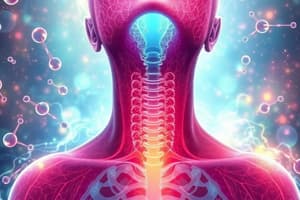Podcast
Questions and Answers
Which of the following is a primary function of the thyroid gland?
Which of the following is a primary function of the thyroid gland?
- Regulating calcium levels in the blood
- Producing insulin to regulate blood sugar
- Secreting hormones essential for metabolism regulation (correct)
- Filtering toxins from the blood
What is the role of iodine in thyroid hormone production?
What is the role of iodine in thyroid hormone production?
- It converts T3 to T4
- It inhibits T3 and T4 production
- It is needed to convert T4 to T3 (correct)
- It regulates the secretion of calcitonin
A deficiency in which mineral is a common cause of hypothyroidism worldwide?
A deficiency in which mineral is a common cause of hypothyroidism worldwide?
- Iron
- Calcium
- Iodine (correct)
- Zinc
Which laboratory finding is characteristic of primary hypothyroidism?
Which laboratory finding is characteristic of primary hypothyroidism?
Which condition is associated with overstimulation of the thyroid gland due to elevated levels of TSH?
Which condition is associated with overstimulation of the thyroid gland due to elevated levels of TSH?
Which medication requires patients to alert health care providers of thyroid medication use due to its potential to decrease serum digoxin levels?
Which medication requires patients to alert health care providers of thyroid medication use due to its potential to decrease serum digoxin levels?
Which of the following is the most significant adverse effect associated with thyroid replacement drug therapy?
Which of the following is the most significant adverse effect associated with thyroid replacement drug therapy?
What is the primary mechanism of action of antithyroid drugs like methimazole and propylthiouracil (PTU)?
What is the primary mechanism of action of antithyroid drugs like methimazole and propylthiouracil (PTU)?
A patient with a known thyroid disorder is also taking Cholestyramine for elevated cholesterol. What adjustment to their thyroid medication is MOST likely necessary, and why?
A patient with a known thyroid disorder is also taking Cholestyramine for elevated cholesterol. What adjustment to their thyroid medication is MOST likely necessary, and why?
A patient is prescribed levothyroxine and is also taking antacids for frequent heartburn. What potential interaction should the patient be aware of, and how should they manage it to ensure optimal medication effectiveness?
A patient is prescribed levothyroxine and is also taking antacids for frequent heartburn. What potential interaction should the patient be aware of, and how should they manage it to ensure optimal medication effectiveness?
Flashcards
Thyroid Hormones
Thyroid Hormones
The thyroid gland secretes these for metabolic regulation: Thyroxine (T4), Triiodothyronine (T3), Calcitonin.
Goiter
Goiter
Enlargement of the thyroid gland, often due to overstimulation from elevated TSH levels.
Myxedema Coma
Myxedema Coma
A severe condition with mental sluggishness, drowsiness and potential coma, often triggered by infection or exposure to cold.
Levothyroxine
Levothyroxine
Signup and view all the flashcards
Thyrotoxic Crisis
Thyrotoxic Crisis
Signup and view all the flashcards
Radioactive Iodine Use
Radioactive Iodine Use
Signup and view all the flashcards
Antithyroid Drugs
Antithyroid Drugs
Signup and view all the flashcards
Graves' Disease
Graves' Disease
Signup and view all the flashcards
Hyperthyroidism
Hyperthyroidism
Signup and view all the flashcards
Myxedema
Myxedema
Signup and view all the flashcards
Study Notes
- Thyroid disorders involve thyroid and anti-thyroid drugs.
Thyroid Gland
- The thyroid gland secretes three hormones essential for metabolism regulation: thyroxine (T4), triiodothyronine (T3), and calcitonin.
- Iodine is required to convert T4 into T3.
- It is located near the parathyroid gland, which is responsible for maintaining adequate calcium levels in the extracellular fluid.
Hypothyroidism
- Can be primary, secondary, or tertiary
- Primary hypothyroidism is a gland problem and the most common type caused by destruction of thyroid tissue or defective hormone synthesis.
- Hormone findings include decreased T3 and T4 levels, and increased TSH levels.
- Secondary hypothyroidism is rare, related to pituitary disease (tumor) with decreased TSH secretion.
- Tertiary hypothyroidism is caused by a reduced level of thyrotropin-releasing hormone (TRH) from the hypothalamus.
- May be transient, related to thyroiditis or discontinuing thyroid hormone therapy.
- Congenital hypothyroidism involves hyposecretion of thyroid hormone during youth, low metabolic rate, retarded growth and sexual development, and slowed mental development.
- Myxedema involves hyposecretion of thyroid hormone during adulthood, decreased metabolic rate, loss of mental and physical stamina, weight gain, loss of hair, firm edema, and yellow dullness of the skin.
- Goiter is the enlargement of the thyroid gland; it results from overstimulation by elevated TSH levels.
- TSH is elevated in goiter, due to little to no thyroid hormone in circulation.
Normal and Goiter Processes
- Normal negative feedback: the hypothalamus releases TRH, the pituitary releases TSH, and the thyroid gland releases T3 and T4 which are sensed by hypothalamus and pituitary.
- When adequate levels are reached, TRH and TSH release is turned off.
- Goiter process: impaired production of T4 and T3 causes there to be no message to stop TRH and TSH release, which results from overstimulation by elevated TSH levels.
Causes
- Iodine deficiency is a cause, needing iodine to convert T4 to T3. It is the most common cause globally and prevalent in iodine-deficient areas
- In locations where iodine intake is adequate, the primary cause is atrophy of the gland.
- Hypothyroidism can also develop because of treatment for hyperthyroidism such as Graves Disease.
- Treatment for hyperthyroidism essentially kills the gland to stop the overproduction of thyroid hormones and lifelong thyroid replacements will be needed.
- Amiodarone and lithium also contribute to hypothyroidism.
Clinical Manifestations
- Clinical manifestations include systemic effects characterized by slowing of body processes.
- Onset of symptoms may occur over months to years unless it occurs after thyroidectomy, thyroid ablation, or treatment with antithyroid drugs.
Complications
- Vary by severity, duration and age of onset
- A complication is Myxedema Coma: mental sluggishness and drowsiness that can progress to lethargy and sudden impairment of consciousness or coma.
- Can be precipitated by infection, drugs (opioids, tranquilizers, barbiturates), exposure to cold, or trauma.
- Characterized by subnormal temperature, hypotension, and hypoventilation. To survive, vital functions must be supported and IV thyroid hormone replacement must be administered.
Thyroid Replacement Drug Therapy
- These drugs include levothyroxine (Synthroid, Levothyroid, Levoxyl; synthetic T4), liothyronine (Cytomel; synthetic T3), and liotrix (Thyrolar; synthetic T3 and T4 combined).
- Administration: Oral medications are taken ½ hour to 1 hour before breakfast to facilitate absorption.
- These increase metabolic rate, protein synthesis, cardiac output, renal perfusion, oxygen use, body temperature, blood volume, and growth process.
- Thyroid preparations replace what the gland cannot produce to achieve normal thyroid levels (euthyroid).
Indications
- For all three forms of hypothyroidism.
- Levothyroxine is preferred because its hormonal content is standardized, making its effect predictable.
- Also used for thyroid replacement in patients whose thyroid glands have been surgically removed or destroyed by radioactive iodine in the treatment of thyroid cancer or hyperthyroidism.
- Indications are also emergency treatment of myxedema coma and hypothyroidism in pregnancy.
Adverse Effects of Drug Therapy
- Adverse effects: cardiac dysrhythmia (most significant), tachycardia, palpitations, angina, hypertension, insomnia, tremors, headache, heat intolerance, sweating, appetite changes, weight loss, menstrual irregularities, diarrhea, nausea, anxiety
- All medications can result in hyperthyroidism
Other Considerations for Drug Therapy
- Contraindications: not used to treat obesity; due to cardiac stimulation, use is contraindicated post MI.
- Interactions: Binding agents, cholestyramine, antacids, antiseizure medications, and anticoagulants.
Nursing Implications
- Assess for drug allergies, contraindications, and potential drug interactions.
- Important to obtain baseline vital signs and weight.
- Cautious use advised for those with cardiac disease, hypertension, and pregnant women.
- Treatment for hypothyroidism should continue during pregnancy.
- Fetal growth may be retarded if maternal hypothyroidism is untreated during pregnancy, dosage may require adjustment every 4 weeks to keep TSH at the lower end of the normal range.
- Teach patients to take thyroid drugs in the morning to avoid insomnia, at the same time daily, and not to switch brands without approval.
- Report any unusual symptoms, chest pain, or heart palpitations.
- Do not take OTC medications without physician approval and therapeutic effects may take several months to occur.
- Alert health care providers to thyroid medication use because it may enhance activity of anticoagulants, diabetic patients may need increased dosages of hypoglycemic meds, and may decrease serum digoxin levels.
Hyperthyroidism
- Excessive thyroid hormones result from Graves’ disease (autoimmune), multinodular disease, Plummer’s disease (toxic nodular disease), or thyroid storm (induced by stress/infection).
- A sustained increase in synthesis and release of thyroid hormones; more often in women ages 20-40.
- Thyrotoxicosis: hypermetabolism from increased circulating T3 and/or T4 that often occurs as Graves’ disease.
Graves Disease
- It is an autoimmune disease of unknown origin that is characterized by diffuse thyroid enlargement and excessive thyroid hormone secretion.
- With Graves disease, antibodies are developed to the TSH receptor which leads to clinical manifestations of thyrotoxicosis and may progress to destruction of thyroid tissue resulting in hypothyroidism.
- Precipitating factors include insufficient iodine supply, infection, and stressful life events combined with genetic factors.
- Accounts for 75% of cases of hyperthyroidism
Clinical Manifestations of Hyperthyroidism
- Related to the hormone excess, it causes increased metabolism and tissue sensitivity to stimulation by the sympathetic nervous system. There is intolerance to heat, increased sensitivity to stimulant drugs, and an elevated basal temperature.
Complications of Hyperthyroidism
- Thyrotoxic Crisis is caused by excess amounts of thyroid hormones that results in acute, rare/emergency conditions where all manifestations are heightened and is potentially life-threatening.
- Death is rare when treatment is initiated.
- Presumed causes are additional stressors.
Thyrotoxic Crisis
- Manifestations include tachycardia, heart failure, shock, hyperthermia, restlessness, agitation, seizures, abdominal pain, nausea, vomiting, diarrhea, delirium, and coma.
Treatment
- The goal is to decrease thyroid hormone levels and clinical manifestations via drug therapy.
- Involves managing respiratory distress, fever reduction, fluid replacement, and managing stressors.
- Treatment for Hyperthyroidism: radioactive iodine destroys the thyroid gland and may cause hypothyroidism.
- Surgery to remove all or part of the thyroid gland may be indicated and will likely require lifelong thyroid hormone replacement.
- Antithyroid drugs (thioamide derivatives), like methimazole (Tapazole) and propylthiouracil (PTU), Betablockers (symptom management only)
- Betablockers block the sympathetic response.
Antithyroid Drugs
- They includes methimazole (Tapazole) and propylthiouracil (PTU).
- Mechanism of Action: inhibit the incorporation of iodine molecules into the amino acid tyrosine, which is required to make T3 and T4.
- Therapeutic Uses: Graves disease, generate euthyroid state prior to thyroid removal, as an adjunct to irradiation of the thyroid gland, and in the emergency treatment of thyrotoxicosis.
Adverse Effects and Nursing Considerations
- Adverse effects: Liver/bone marrow toxicity, injury & hepatitis, and overmedication can result in symptoms of hypothyroidism.
- Contraindications: Drug allergy.
- Improvements can take 1-2 weeks.
- Monitor vital signs, I&O, and weights.
- Administer medications at a consistent time with meals.
- Do not discontinue abruptly.
- Beta-blockers may be administered to decrease tremors and tachycardia.
- Monitor for hypothyroidism indications and CBC.
Social Determinants of Health
- Levothyroxine costs $56 for 90 tablets.
- PTU costs $100 without insurance or $18 with insurance.
- Methimazole costs $20 with insurance for 90 tablets.
Studying That Suits You
Use AI to generate personalized quizzes and flashcards to suit your learning preferences.




